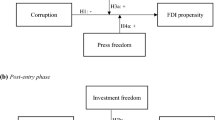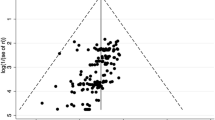Abstract
This paper examines the impact of corruption on foreign direct investment (FDI). It argues that corruption results not only in a reduction in FDI, but also in a change in the composition of country of origin of FDI. It presents two key findings. First, corruption results in relatively lower FDI from countries that have signed the Organization for Economic Cooperation and Development Convention on Combating Bribery of Foreign Public Officials in International Business Transactions. This suggests that laws against bribery abroad may act as a deterrent against engaging in corruption in foreign countries. Second, corruption results in relatively higher FDI from countries with high levels of corruption. This suggests that investors who have been exposed to bribery at home may not be deterred by corruption abroad, but instead seek countries where corruption is prevalent.

Similar content being viewed by others
References
Ades, A. and Di Tella, R. (1997) ‘National champions and corruption: some unpleasant interventionist arithmetic’, Economic Journal 107 (443): 1023–1043.
Bevan, A.A. and Estrin, S. (2004) ‘The determinants of foreign direct investment into European transition economies’, Journal of Comparative Economics 32 (4): 775–787.
Brainard, L. (1993) ‘A simple theory of multinational corporations and trade with a trade-off between proximity and concentration’, NBER working paper #4269, National Bureau of Economic Research, Cambridge, MA.
Brenton, P., Di Mauro, F. and Lucke, M. (1999) ‘Economic integration and FDI: an empirical analysis of foreign investment in the EU and in central and eastern Europe’, Empirica 26 (2): 95–121.
Calhoun, M.A. (2002) ‘Unpacking liability of foreignness: identifying culturally driven external and internal sources of liability for the foreign subsidiary’, Journal of International Management 8 (3): 301–321.
CIA (2005) World Factbook. https://www.cia.gov/cia/publications/factbook/index.html.
De Soto, H. (1989) The Other Path, Harper & Row: New York.
Donaldson, T. (1996) ‘Values in tension: ethics away from home’, Harvard Business Review 74 (5): 4–12.
Dunning, J.H. (1977) ‘Trade, Location of Economic Activity and the MNE: A Search for an Eclectic Approach’, in B. Ohlin, P.O. Hesselborn and P.M. Wijkman (eds.) The International Allocation of Economic Activity, Macmillan: London, 395–418.
Dunning, J.H. (1998) ‘Location and the multinational enterprise: a neglected factor?’ Journal of International Business Studies 29 (1): 45–66.
Eaton, J. and Tamura, A. (1995) ‘Bilateralism and regionalism in Japanese and US trade and direct foreign investment patterns’, NBER working paper #4758, National Bureau of Economic Research, Cambridge, MA.
Elliot, K. (1997) ‘Corruption as an International Policy Problem: Overview and Recommendations’, in K. Elliot (ed.) Corruption and the Global Economy, Institute for International Economics: Washington, DC, 175–233.
Encyclopedia Britannica (2005) http://www.britannica.com/.
Eriksson, K., Johanson, J., Majkgard, A. and Sharma, D.D. (1997) ‘Experiential knowledge and cost in the internationalization process’, Journal of International Business Studies 28 (2): 337–360.
Feenstra, R.C., Markusen, J.R. and Rose, A.K. (2001) ‘Using the gravity equation to differentiate among alternative theories of trade’, Canadian Journal of Economics 34 (2): 430–447.
Frankel, J. and Rose, A. (2002) ‘An estimate of the effect of common currencies on trade and income’, Quarterly Journal of Economics 117 (2): 437–466.
Ghemawat, P. (2001) ‘Distance still matters. The hard reality of global expansion’, Harvard Business Review 79 (8): 137–147.
Gordon Jr, R.G. (ed.) (2005) Ethnologue: Languages of the World, 15th edn, SIL International: Dallas, TX, Online version: http://www.ethnologue.com/.
Habib, M. and Zurawicki, L. (2002) ‘Corruption and foreign direct investment’, Journal of International Business Studies 33 (2): 291–307.
Hakkala, K., Norback, P. and Svaleryd, H. (2004) ‘FDI and corruption: evidence from Swedish multinational firms’, Paper presented at the European Trade Study Group meeting in Nottingham, UK, 11 September, http://www.etsg.org/ETSG2004/Papers/Hakkala.pdf.
Henisz, W.J. (2000) ‘The institutional environment for multinational investment’, Journal of Law, Economics and Organization 16 (2): 334–364.
Heritage Foundation (2005) ‘Index of ECONOMIC Freedom’, [www document] http://www.heritage.org/research/features/index/. (accessed 24 December 2005).
Hines, J.R. (1995) ‘Forbidden payment: foreign bribery and american business after 1977’, NBER working paper #5266, National Bureau of Economic Research, Cambridge, MA.
Horstmann, I.J. and Markusen, J.R. (1992) ‘Endogenous market structures in international trade (Natura Facit Saltum)’, Journal of International Economics 32 (1–2): 109–129.
Huntington, S.P. (1968) Political Order in Changing Societies, Yale University Press: New Haven, CT.
Hymer, S. (1976) The International Operations of National Firms: A Study of Direct Foreign Investment, MIT Press: Cambridge, MA.
Johanson, J. and Vahlne, J. (1977) ‘The internationalization process of the firm: a model of knowledge development and increasing foreign market commitments’, Journal of International Business Studies 8 (1): 23–32.
Johanson, J. and Wiedersheim-Paul, F. (1975) ‘The internationalization of the firm: four Swedish case studies’, Journal of Management Studies 12 (3): 305–322.
Kaikati, J. and Label, W.A. (1980) ‘The foreign antibribery law: friend or foe?’ Columbia Journal of World Business 15 (1): 46–51.
Kaufmann, D. (1997) ‘Corruption: the facts’, Foreign Policy 107(Summer): 114–131.
Kaufmann, D., Kraay, A. and Mastruzzi, M. (2003) ‘Governance matters iii: governance indicators 1996–2002’, World Bank Working Paper #3106, World Bank, Washington, DC.
La Porta, R., Lopez-de-Silanes, F., Shleifer, A. and Vishny, R.W. (1998) ‘Law and finance’, Journal of Political Economy 106 (6): 1113–1155.
Lambsdorff, J.G. (2003) ‘How corruption affects persistent capital flows’, Economics of Governance 4 (3): 229–243.
Leff, N.H. (1989) ‘Economic Development through Bureaucratic Corruption’, in A.J. Heidenheimer, M. Johnston and V.T. LeVine (eds.) Political Corruption: A Handbook, New Brunswick NJ: Transaction Books, pp: 389–403.
Linneman, H. (1966) An Econometric Study of International Trade Flows, North-Holland: Amsterdam.
Lui, F.T. (1985) ‘An equilibrium queuing model of bribery’, Journal of Political Economy 93 (4): 760–781.
Maddala, G.S. (1983) Limited-Dependent and Qualitative Variables in Econometrics, Cambridge University Press: New York.
Mauro, P. (1995) ‘Corruption and growth’, Quarterly Journal of Economics 110 (3): 681–712.
Mauro, P. (1998) ‘Corruption and the composition of government expenditure’, Journal of Public Economics 69 (2): 263–279.
OECD (1996) ‘Recommendation of the Council on the Tax Deductibility of Bribes to Foreign Public Officials’, [www document] http://www.olis.oecd.org/olis/1996doc.nsf/LinkTo/c(96)27-final (accessed July 6, 2005).
OECD (1997) ‘Convention on Combating Bribery of Foreign Public Officials in International Business Transactions’, [www document] http://www.olis.oecd.org/olis/1997doc.nsf/LinkTo/daffe-ime-br(97)20 (accessed July 6, 2005).
OECD (2004) International Direct Investment Statistics Yearbook: 1992–2003, Organization for Economic Cooperation and Development: Paris.
OECD (2005) International Direct Investment Statistics Yearbook: 1992/2003–2004 Edition. Paris: OECD.
Prahalad, C.K. and Bettis, R.A. (1986) ‘The dominant logic: a new linkage between diversity and performance’, Strategic Management Journal 7 (6): 485–502.
Rodriguez, P., Uhlenbruck, K. and Eden, L. (2005) ‘Government corruption and the entry strategies of multinationals’, Academy of Management Review 30 (2): 383–396.
Rose-Ackerman, S. (1999) Corruption and Government, Cambridge University Press: Cambridge.
Shleifer, A. and Vishny, R.W. (1993) ‘Corruption’, Quarterly Journal of Economics 108 (3): 599–617.
Smarzynska, B.K. and Wei, S. (2000) ‘Corruption and composition of foreign direct investment: firm-level evidence’, NBER working paper #7969, National Bureau of Economic Research, Cambridge, MA.
Tanzi, V. (1998) ‘Corruption around the world: causes, consequences, scope, and cures’, IMF Staff Papers 45 (4): 559–594.
Tobin, J. (1958) ‘Estimation of relationships for limited dependent variables’, Econometrica 26 (1): 24–36.
UNCTAD (2005) ‘World investment directory on-line. FDI country profiles’, [www document] http://www.unctad.org/Templates/Page.asp?intItemID=3198&lang=1 (accessed June 7, 2005).
US Congress (1977) The Foreign Corrupt Practices Act of 1977, [www document] http://www.usdoj.gov/criminal/fraud/fcpa/fcpastat.htm (accessed June 20, 2005).
Voyer, P.A. and Beamish, P.W. (2004) ‘The effect of corruption on japanese foreign direct investment’, Journal of Business Ethics 50 (3): 211–224.
Wei, S. (2000a) ‘How taxing is corruption on international investors?’ The Review of Economic and Statistics 82 (1): 1–11.
Wei, S. (2000b) ‘Local corruption and global capital flows’, Brookings Papers on Economic Activity 2000 (2): 303–354.
Wei, S. and Wu, Y. (2001) ‘Negative alchemy? Corruption, composition of capital flows, and currency crises’, NBER working paper #8187, National Bureau of Economic Research, Cambridge, MA.
Wheeler, D. and Mody, A. (1992) ‘International investment location decisions: the case of US firms’, Journal of International Economics 33 (1–2): 57–76.
World Bank (2005) World Development Indicators, [www document] http://www.worldbank.org/data/ (accessed July 10, 2005).
Zaheer, S. (1995) ‘Overcoming the liability of foreignness’, Academy of Management Journal 38 (2): 341–363.
Acknowledgements
The paper benefited from suggestions by the Guest Editor Peter Rodriguez, three anonymous reviewers, the discussant Marty Meznar, Chuck Kwok, Kendall Roth, Annique Un, and the audience at the JIBS Focused Issue Workshop in Phoenix, Arizona. The School of Global Management and Leadership at Arizona State University at the West campus, Lally School of Management and Technology at Rensselaer Polytechnic Institute, the Department of Economics at Rensselaer Polytechnic Institute, and the Center for International Business Education and Research at Thunderbird, The Garvin School of International Management, provided financial support for the Workshop. Funding from the Center for International Business Education and Research at the University of South Carolina is gratefully acknowledged. All errors remain mine.
Author information
Authors and Affiliations
Corresponding author
Additional information
Accepted by Lorraine Eden, Army Hillman, Peter Rodriguez, Donald Siegel and Peter Rodriguez, Guest Editors, 17 April 2006. This paper has been with the author for two revisions.
Appendix
Appendix
Home and host countries
Host countries
Algeria, Angola, Anguilla, Argentina, Armenia, Aruba, Australia, Austria, Azerbaijan, Bahamas, Barbados, Belgium/Luxembourg, Belize, Benin, Bermuda, Bolivia, Brazil, Brunei, Bulgaria, Burkina Faso, Burundi, Cambodia, Cameroon, Canada, Cape Verde, Central African Republic, Chad, Chile, Colombia, Comoros, Costa Rica, Cuba, Czech Republic, Denmark, Djibouti, Dominican Republic, Ecuador, El Salvador, Eritrea, Estonia, Ethiopia, Finland, France, Gambia, Germany, Greece, Guatemala, Guyana, Haiti, Honduras, Hungary, Iceland, Ireland, Italy, Jamaica, Japan, Kazakhstan, Korea, Kyrgyzstan, Latvia, Lithuania, Macau, Macedonia, Malawi, Mali, Mauritius, Mexico, Moldova, Mongolia, Morocco, Mozambique, Myanmar, Netherlands, Netherlands Antilles, New Zealand, Nicaragua, Norway, Panama, Paraguay, Peru, Poland, Portugal, Russia, Rwanda, Saint Kitts Nevis, Saint Lucia, Sierra Leone, Slovakia, Slovenia, Somalia, Spain, Suriname, Sweden, Switzerland, Tanzania, Trinidad Tobago, Tunisia, Turkey, Uganda, UK, Uruguay, US, Uzbekistan, Venezuela, Zambia, Zimbabwe.
Home countries
Afghanistan, Albania, Algeria, Andorra, Angola, Anguilla, Antigua Barbuda, Argentina, Armenia, Aruba, Australia, Austria, Azerbaijan, Bahamas, Bahrain, Bangladesh, Barbados, Belarus, Belgium/Luxembourg, Belize, Bermuda, Bhutan, Bolivia, Bosnia Herzegovina, Botswana, Brazil, British Virgin Islands, Brunei, Bulgaria, Cameroon, Canada, Cape Verde, Cayman Islands, Chad, Channel Islands, Chile, China, Colombia, Congo, Cook Islands, Costa Rica, Croatia, Cuba, Cyprus, Czech Republic, Denmark, Dominica, Dominican Republic, Ecuador, Egypt, El Salvador, Estonia, Faeroe Islands, Fiji, Finland, France, French Polynesia, Gambia, Georgia, Germany, Gibraltar, Greece, Grenada, Guatemala, Guernsey, Guinea-Bissau, Guyana, Honduras, Hong Kong, Hungary, Iceland, India, Indonesia, Iran, Iraq, Ireland, Isle of Man, Israel, Italy, Ivory Coast, Jamaica, Japan, Jersey, Jordan, Kazakhstan, Kenya, Kuwait, Kyrgyzstan, Laos, Latvia, Lebanon, Liberia, Libya, Liechtenstein, Lithuania, Macau, Macedonia, Malawi, Malaysia, Mali, Malta, Marshall Islands, Mauritania, Mauritius, Mexico, Moldova, Monaco, Mongolia, Morocco, Myanmar, Nauru, Nepal, Netherlands, Netherlands Antilles, New Caledonia, New Zealand, Nicaragua, Nigeria, Niue, North Korea, Northern Marianas, Norway, Oman, Pakistan, Palau, Panama, Papua New Guinea, Paraguay, Peru, Philippines, Poland, Portugal, Puerto Rico, Qatar, Reunion, Romania, Russia, Saint Kitts Nevis, Saint Vincent Grenadines, San Marino, Saudi Arabia, Serbia Montenegro, Seychelles, Sierra Leone, Singapore, Slovakia, Solomon Islands, South Africa, South Korea, Spain, Sri Lanka, Sudan, Suriname, Swaziland, Sweden, Switzerland, Syria, Taiwan, Tajikistan, Tanzania, Thailand, Trinidad and Tobago, Tunisia, Turkey, Turkmenistan, Turks and Caicos, Uganda, UK, Ukraine, United Arab Emirates, Uruguay, US Virgin Islands, US, Uzbekistan, Vanuatu, Vatican, Venezuela, Viet Nam, Wallis and Futuna, Western Samoa, Yemen, Zambia, Zimbabwe.
Home countries that do not appear in the list of host countries
Afghanistan, Albania, Andorra, Antigua Barbuda, Bahrain, Bangladesh, Barbados, Belarus, Bhutan, Bosnia Herzegovina, Botswana, British Virgin Islands, Cayman Islands, Channel Islands, China, Congo, Cook Islands, Croatia, Cyprus, Dominica, Egypt, Faeroe Islands, Fiji, French Polynesia, Georgia, Gibraltar, Grenada, Guernsey, Guinea-Bissau, Hong Kong, India, Indonesia, Iran, Iraq, Isle of Man, Israel, Ivory Coast, Jersey, Jordan, Kenya, Kuwait, Laos, Lebanon, Liberia, Libya, Liechtenstein, Malaysia, Malta, Marshall Islands, Mauritania, Monaco, Nauru, Nepal, New Caledonia, Nigeria, Niue, North Korea, Northern Marianas, Oman, Pakistan, Palau, Papua New Guinea, Philippines, Puerto Rico, Qatar, Reunion, Romania, Saint Vincent Grenadines, San Marino, Saudi Arabia, Serbia Montenegro, Seychelles, Singapore, Solomon Islands, South Africa, Sri Lanka, Sudan, Swaziland, Syria, Taiwan, Tajikistan, Thailand, Turkmenistan, Turks and Caicos, Ukraine, United Arab Emirates, US Virgin Islands, Vanuatu, Vatican, Viet Nam, Wallis and Futuna, Western Samoa, Yemen.
Rights and permissions
About this article
Cite this article
Cuervo-Cazurra, A. Who cares about corruption?. J Int Bus Stud 37, 807–822 (2006). https://doi.org/10.1057/palgrave.jibs.8400223
Received:
Revised:
Accepted:
Published:
Issue Date:
DOI: https://doi.org/10.1057/palgrave.jibs.8400223




